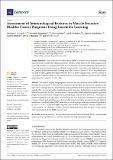Assessment of immunological features in muscle-invasive bladder cancer prognosis using ensemble learning
Abstract
The clinical staging and prognosis of muscle-invasive bladder cancer (MIBC) routinely includes the assessment of patient tissue samples by a pathologist. Recent studies corroborate the importance of image analysis in identifying and quantifying immunological markers from tissue samples that can provide further insight into patient prognosis. In this paper, we apply multiplex immunofluorescence to MIBC tissue sections to capture whole-slide images and quantify potential prognostic markers related to lymphocytes, macrophages, tumour buds, and PD-L1. We propose a machine-learning-based approach for the prediction of 5 year prognosis with different combinations of image, clinical, and spatial features. An ensemble model comprising several functionally different models successfully stratifies MIBC patients into two risk groups with high statistical significance (p value < 1×10−5). Critical to improving MIBC survival rates, our method correctly classifies 71.4% of the patients who succumb to MIBC, which is significantly more than the 28.6% of the current clinical gold standard, the TNM staging system.
Citation
Gavriel , C , Dimitriou , N , Brieu , N , Nearchou , I P , Arandelovic , O , Schmidt , G , Harrison , D J & Caie , P D 2021 , ' Assessment of immunological features in muscle-invasive bladder cancer prognosis using ensemble learning ' , Cancers , vol. 13 , no. 7 , 1624 . https://doi.org/10.3390/cancers13071624
Publication
Cancers
Status
Peer reviewed
ISSN
2072-6694Type
Journal article
Description
Funding: This research received financial support from Definiens GmbH and the Industrial Centre for AI Research in digital Diagnostics (iCAIRD) which is funded by Innovate UK on behalf of UK Research and Innovation (UKRI) [project number: 104690].Collections
Items in the St Andrews Research Repository are protected by copyright, with all rights reserved, unless otherwise indicated.

